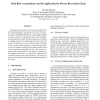31 search results - page 4 / 7 » Single Database Private Information Retrieval with Logarithm... |
148
click to vote
CRYPTO
2008
Springer
15 years 3 months ago
2008
Springer
In cryptography, there has been tremendous success in building various two-party protocols with small communication complexity out of homomorphic semantically-secure encryption sc...
196
click to vote
SIGMOD
2008
ACM
16 years 2 months ago
2008
ACM
Mobile devices equipped with positioning capabilities (e.g., GPS) can ask location-dependent queries to Location Based Services (LBS). To protect privacy, the user location must n...
105
click to vote
CCS
2010
ACM
15 years 6 months ago
2010
ACM
Private Information Retrieval (PIR) protocols allow users to learn data items stored at a server which is not fully trusted, without disclosing to the server the particular data e...
94
Voted
AINA
2006
IEEE
15 years 8 months ago
2006
IEEE
This paper points out the privacy issue in the OCSP (Online Certificate Status Protocol), namely, the OCSP responder learns confidential information – who sends a message to w...
95
Voted
IJISEC
2010
14 years 11 months ago
2010
Abstract Since the concept of private information retrieval (PIR) was first formalized by Chor et. al, various constructions have been proposed with a common goal of reducing commu...

